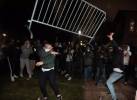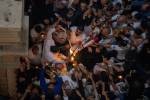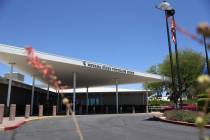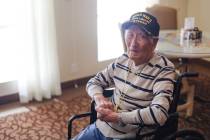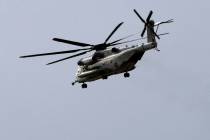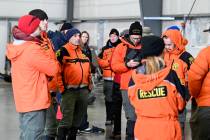Soldier loses leg in Afghanistan but not his love for America
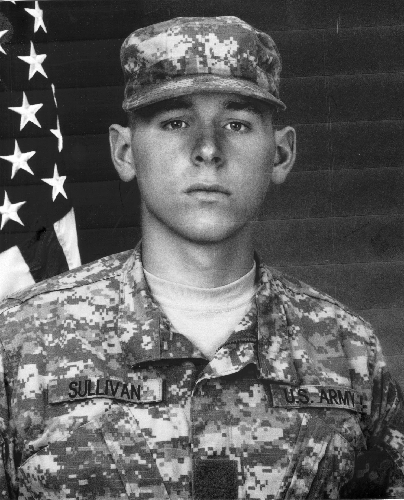
Army Pfc. Blaine Sullivan remembers rushing the badly wounded Afghan National Army soldier toward the helicopter landing zone.
Hell had broken loose that late November day in Afghanistan in the dark heart of Taliban country.
It’s called Sangsar. It’s the town where Mullah Mohammad Omar founded the Taliban movement and called its first meeting.
The place is considered so dangerous coalition troops had rarely seen it in nine years, and none had set foot there since 2007.
Sullivan and his fellow Alpha Company soldiers, members of the Army’s 101st Airborne Division, 2nd Battalion, 502nd Infantry Regiment, 3rd Platoon, parachuted into the Sangsar area to hit the Taliban where it lives.
The rural farming village had been transformed into a bomb factory. Alpha Company already had uncovered an IED factory and helped destroy a major explosives cache big enough to produce hundreds of roadside bombs.
On Nov. 22, the fighting grew meaner by the minute as Alpha Company approached Sangsar.
The paths and neighborhoods were littered with IEDs.
The wounded ANA soldier, one of a group that worked in tandem with U.S. troops, had stepped on an antipersonnel mine and had lost his right leg.
The Americans would do their best to save their Afghan ally.
Sullivan, a 19-year-old graduate of Cimarron Memorial High School, had been in country since June. His platoon already had tangled with plenty of antipersonnel mines and improvised explosive devices.
Twice vehicles in which Sullivan had been riding were blown up by IEDs.
“We loaded the ANA soldier into a stretcher and started carrying him back to the helicopter landing zone,” Sullivan recalled. “No more than five or ten feet after picking him up, the explosion went off. I remember flying a few feet through the air and landing on my stomach. I remember having my head to one side and seeing just brown dust everywhere. I remember hearing one of my buddies, Specialist Moore, talk to me. He was talking to me, and once he stopped talking to me I woke up … in Germany.”
Sullivan’s wounds were nearly identical to those suffered by the Afghan National Army soldier. Sullivan’s right leg was so damaged it had to be amputated above the knee. He suffered severe shrapnel and blast wounds.
In minutes he was medevaced from Sangsar to Kandahar Airfield, then flown to Bagram Airfield for more emergency medical treatment before being transported to Germany and Landstuhl Regional Medical Center.
Once Sullivan was stable, he was flown to Walter Reed Army Medical Center. It was there, with his mother, Stacey, at his bedside, that I recently spoke to him by phone.
Still a teenager not long out of high school, where he lettered in football and baseball, Sullivan had seen comrades killed and wounded.
He had taken vicious enemy fire and had been critically wounded.
He already had undergone numerous surgeries and had required 100 units of blood products to survive.
In short, Blaine Sullivan had more than earned the right to give any opinion he wanted about his war experience. But instead of the sounds of cynicism and bitterness, I heard a voice full of strength, clarity, acceptance, and even hope. To me, that American voice was a gift.
“I joined the Army pretty much to better myself as a person,” Sullivan said. “The discipline that the infantry gives you is something that anyone can use in their life. Being over there really gives you a different perspective. It makes you love America a lot more. Being over there and seeing how these people live, in straight-up mud huts, and survive on the grapes they raise and the bread that they make … it really gives you an appreciation for what we have back in America.”
They all knew the mission would be difficult and dangerous. While putting a knife into the heart of the Taliban, the soldiers also were assigned the even more challenging task of befriending wary villagers.
“We wanted to win the minds and hearts of the people and lure them away from the Taliban,” Sullivan said. “That was our main mission.”
Now his assignment is recovering from a life-changing wound.
But if you’re looking for someone who is crushed by a traumatic injury, Pfc. Sullivan isn’t your man. To hear him tell it, he’s looking forward to the new challenge.
“I’ve always kind of had the attitude it is what it is,” he said. “I’ve accepted the fact I’m only going to have one leg. It’s not the end of the world. It really isn’t, with the advances in medical science we have right now. I’ll be wearing jeans, and you won’t even be able to tell I have a fake leg. Really, it’s not the end of the world.”
Mother Stacey said her spirits have been buoyed by her son’s strength.
“Obviously I don’t think anybody knows an individual as much as his mother does,” she said. “I don’t think I ever thought that he wouldn’t make it because he’s so strong-willed. But I was terrified to actually see the condition that he was in, because he’s always been such a physically big, strong, athletic person. My biggest fear was how this was going to impact his psyche and his image of himself.
“He said, ‘Mom, I’ll get through this. Don’t worry.’ I’ve just been kind of fine since then. If he feels he can do this, then I can do this.”
Curt Sullivan coached his son on Little League baseball diamonds and recognized his inner strength at an early age.
By the time Blaine was 14, he already had displayed uncommon courage. During an offroading excursion in Southern Utah, Curt’s right leg was badly broken in a rollover. Blaine comforted his father, fixed a tourniquet, and then went for help.
“The accident ripped my right leg three-fourths of the way off,” Curt said, noting the irony. “Blaine was credited with saving my life. The same leg that I hurt is the one that he lost.”
The father’s pride is tempered with the knowledge he nearly lost his son in a war with a complex and confounding mission.
“I admired him for taking that step to join the armed services,” Curt said. “Naturally, as a parent you’re always concerned, and you always have your emotions. As selfish as that may be, I didn’t want to see my son go over there. He wasn’t looking at it as much as a job as doing something worthwhile. At 19 years old, he’s been exposed to more in a short amount of time than most people will ever be exposed to in their entire lives.
“He basically told me, ‘Dad, I knew what I was signing on for.’ It’s not a surprise to me that he does have that attitude. If he had the chance to sign up and do it all over again, I truly believe he would.”
There are countless hours of physical therapy ahead for Pfc. Sullivan, who has been transferred to the Naval Medical Center in San Diego; but he already has set his sights on being upright and mobile on his new leg in time to greet members of his squad when their tour of duty ends and they return to the United States.
“They’re all great guys,” Sullivan said. “When you’ve been living in a tent with someone for six months, and you have close-to-death experiences with them, you grow to love these guys and grow to care about them a lot. I think about how they’re doing, and I know they’re thinking about me.”
That welcome home ceremony is about five months away. Blaine Sullivan has a lot of work to do.
Those who have met this brave soldier would never bet against him.
John L. Smith’s column appears Sunday, Tuesday, Wednesday and Friday. E-mail him at Smith@reviewjournal.com or call (702) 383-0295. He also blogs at lvrj.com/blogs/smith.




